Each of us an artist, each life a canvas
November 20th, 2013
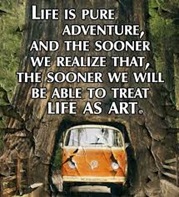
“A writer – and, I believe, generally all persons – must think that whatever happens to him or her is a resource. All things have been given to us for a purpose, and an artist must feel this more intensely. All that happens to us, including our humiliations, our misfortunes, our embarrassments, all is given to us as raw material, as clay, so that we may shape our art.” ~ Jorge Luis Borges
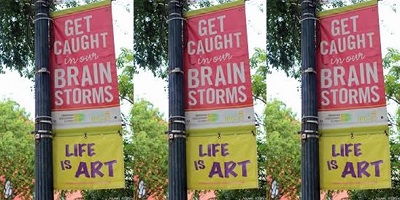
Which questions are more important to you?
November 13th, 2013

What kind of fancy car do you drive?
Or…
How many times have you taken an individual to an appointment who didn’t have transportation?
What is the square footage of your house?
Or…
How many people have you welcomed into your home?
How many fancy clothes you had in your closet?
Or…
How many of those clothes have you given away to those who didn’t have any?
What social class are you in?
Or…
What kindness have you displayed?
How many material possessions do you have?
Or…
Do these material possessions dictate your life?
What is your highest salary?
Or…
Have you trampled over any people to obtain that salary.

How much overtime do you work?
Or…
Do you work overtime for your family? Read more »
Four Steps to Success
November 13th, 2013
When confronted with a difficult problem take a step back—literally…
It’s what a study conducted at Radboud University Nijmegen in the Netherlands suggests. Thirty-eight volunteers took a test that presented words written in different colors. 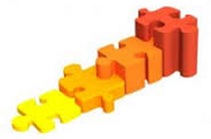 The goal was to identify the colors, not the words—a task that was especially tricky when a word related to a color, such as “blue,” appeared in a different color, such as red.
The goal was to identify the colors, not the words—a task that was especially tricky when a word related to a color, such as “blue,” appeared in a different color, such as red.
As the volunteers stood by computers for the test, they were told to take four steps away in various directions. Remarkably, their performance on the test was significantly faster after they took the steps backward, compared with forward or sideways, says psychologist Severine Koch, who headed the study.
She explains that because backing away “is usually performed in dangerous or problematic situations,” doing so apparently tends to prompt the brain to concentrate in order to meet a challenge. This experiment corroborates a study that the researches published in 2008, which found that extending one’s arm —as if warding something off-enhanced cognition compared with flexing the arm in a beckoning position.
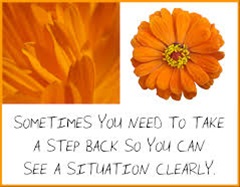
Forgiveness
November 13th, 2013
Forgiveness…is a choice, a decision. It is not earned nor is it deserved.
Forgiveness…is not condoning/excusing/forgetting/justifying/calming Down
Forgiveness…is accepting what happened/ceasing to be angry/being neutral/making yourself feel good. It is the gift you first give to yourself so you can
Quiet your angry feelings and
Change destructive thoughts.

YOUR SUCCESS IN RELATIONSHIPS AND IN LIFE IS GOING TO BE LIMITED OR ENHANCED BY HOW WELL YOU EXERCISE THESE TWO SKILLS:
- YOUR ABILITY TO CONFRONT AND RESOLVE NEGATIVE THINGS QUICKLY, DIRECTLY, LOVINGLY, THOROUGHLY AND EFFECTIVELY
- YOUR ABILITY TO LET GO AND LEAVE BEHIND THE THINGS THAT ARE NOT RESOLVABLE.
Four States of Forgiveness
November 13th, 2013
1. TO FOREGO—To leave alone; detach; take a vacation from it
2. TO FOREBEAR—To abstain from punishing; to be generous
3. TO FORGET—To refuse to dwell; to refuse to recollect; to lay to rest the emotion surrounding the memory
4. TO FORGIVE—To abandon the debt. A conscious decision to cease to harbor the resentment; to forgive the debt and give up the resolve to retaliate
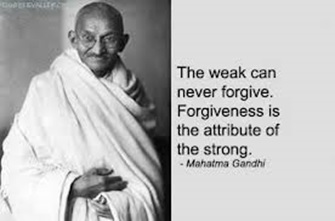
Healthy Personal Boundaries—What They Are and Why They Matter
November 12th, 2013
Learning to set healthy personal boundaries is necessary for maintaining a positive self-concept, or self-image. It is our way of communicating to others that we have self-respect, self-worth, and will not allow others to define us. Personal boundaries are the physical, emotional and mental limits we establish to protect ourselves from being manipulated, used, or violated by others. 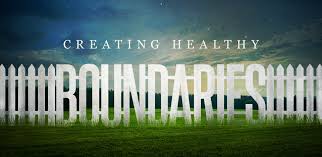 They allow us to separate who we are, and what we think and feel, from the thoughts and feelings of others. Their presence helps us express ourselves as the unique individuals we are, while we acknowledge the same in others.
They allow us to separate who we are, and what we think and feel, from the thoughts and feelings of others. Their presence helps us express ourselves as the unique individuals we are, while we acknowledge the same in others.
Boundaries are tools for building cooperation in relationship. Boundaries do not depend on fear or power. They are for letting others know what you want. Know that you have a right to personal boundaries. Their presence in your life gives you
- An improved sense of self-confidence and self-concept
- A deepened sense of your own emotional reality
- A better ability to communicate with others
- More fulfilling relationships
- A greater sense of stability and control over you own life Read more »
Boundaries
November 12th, 2013
We hear the phrase “set your boundaries” quite often and I’m never really sure what someone means by that. Perhaps it’s something like, “This is what I will do and this is what I won’t do.”
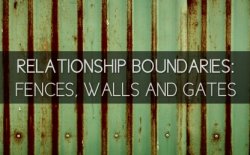 And what if we don’t “set our boundaries?” What’s so bad that could happen? Plenty, though at first pretty subtle. No, I take that back. It’s not subtle but by our denial and minimization (two handy dandy feats of our mind) we can push any consequence to the nether regions and go about our merry seemingly not bothered at all. Then, somewhere in the future, POW, we explode, we’re angry, we’re resentful, we’re depressed, we’re jealous. What the heck? Where did that come from? It was there all along but we snubbed and ignored these inevitable experiences that come from not honoring our boundaries.
And what if we don’t “set our boundaries?” What’s so bad that could happen? Plenty, though at first pretty subtle. No, I take that back. It’s not subtle but by our denial and minimization (two handy dandy feats of our mind) we can push any consequence to the nether regions and go about our merry seemingly not bothered at all. Then, somewhere in the future, POW, we explode, we’re angry, we’re resentful, we’re depressed, we’re jealous. What the heck? Where did that come from? It was there all along but we snubbed and ignored these inevitable experiences that come from not honoring our boundaries.
Any way we cannot be honest and get away with it and live a great life filled with vitality and zest and daringness and health? Nope. Why not? Cuz that just isn’t life’s design. Kind of like asking, “How come if I am on the ice rink with tennis shoes I keep slipping?” Or, “How come if I am wearing hockey skates on a basketball court I keep losing the game?” Read more »
The Rules for Being Human
November 11th, 2013
When you were born, you didn’t come with an owner’s manual; these guidelines make life work better.
- You will receive a body. You may like it or hate it, but it’s the only thing you are sure to keep for the rest of your life.
- You will learn lessons. You are enrolled in a full-time informal school called “Life on Planet Earth”. Every person or incident is the Universal Teacher.
- There
 are no mistakes, only lessons. Growth is a process of experimentation. “Failures” are as much a part of the process as “success.”
are no mistakes, only lessons. Growth is a process of experimentation. “Failures” are as much a part of the process as “success.” - A lesson is repeated until learned. It is presented to you in various forms until you learn it — then you can go on to the next lesson.
- If you don’t learn easy lessons, they get harder. External problems are a precise reflection of your internal state. When you clear inner obstructions, your outside world changes. Pain is how the universe gets your attention.
- You will know you’ve learned a lesson when your actions change. Wisdom is practice. A little of something is better than a lot of nothing. Read more »
Emotional Quicksand
November 11th, 2013
Have you ever felt like you were trapped in emotional quicksand? You’re moving along confidently in the world and then – wham! – your next step lands you in a quagmire of depression, anxiety, anger, discontent, loneliness, or grief. Or…maybe all of the above.
Being of the human persuasion, we have a lot of things happen to us in life, some of which are good and some of which aren’t so good. These latter events are the ones that often make us feel stuck and as though we’re sinking fast. Most of us struggle mightily to get out of the trap. It’s scary and it feels like we’re being sucked, down, down, and there is nothing we can do to get out to get out of the trap. We frantically flail and flail around, trying desperately to save ourselves, only to find that we’re getting pulled down even faster and the quicksand’s grip has become even tighter. When we are stuck in quicksand, our immediate impulse is to struggle and fight to get out. BUT that’s exactly what we mustn’t do in quicksand—because as we put weight down on one part of our body (our foot), it goes deeper. So the more we struggle, the deeper we sink—and the more we struggle.  It’s very much a no-win situation. With quicksand, there’s only one option for survival—to spread the weight of our body over a large surface area—lay down. It goes against all of our instincts to lay down and really be with the quicksand, but that’s exactly what we have to do. So it is with distress— we struggle and fight against it, but we’ve perhaps never considered just letting it be, and being with the distressing thoughts and feelings. But if we did, we’d find that we get through it and survive and thrive far more effectively than if we’d fought and struggled.
It’s very much a no-win situation. With quicksand, there’s only one option for survival—to spread the weight of our body over a large surface area—lay down. It goes against all of our instincts to lay down and really be with the quicksand, but that’s exactly what we have to do. So it is with distress— we struggle and fight against it, but we’ve perhaps never considered just letting it be, and being with the distressing thoughts and feelings. But if we did, we’d find that we get through it and survive and thrive far more effectively than if we’d fought and struggled.
Guess what? This is a hard thing to do because, just as our first reaction to finding our bodies sinking is to panic and thrash around to save ourselves, so our reaction is to sinking emotionally. It’s counter-intuitive and not very natural to relax and stop struggling when everything inside is yelling, “Do something!”
Truth be told, though, we are doing something when we stop struggling against our emotions. We are allowing. We are creating space for our emotions to just be rather than trying to suppress them or make them go away. We are floating with the quicksand and making the slow, steady progress we need to get to firmer ground.
Being You
October 23rd, 2013
 is when another’s needs and wants are as precious and important to you as your own. Not more important than your own because then your importance is diminished in your own eyes and in the eyes of your partner (how you treat yourself is how your partner may likely treat you). Not less important than your own because that leads to being dismissive of the importance of your partner in your life. It is when we refuse to use anything from the past against another in the present. We refuse the impulse to use another’s vulnerability against, leaving them open to feeling shame or worse yet, regret that they confided in another.
is when another’s needs and wants are as precious and important to you as your own. Not more important than your own because then your importance is diminished in your own eyes and in the eyes of your partner (how you treat yourself is how your partner may likely treat you). Not less important than your own because that leads to being dismissive of the importance of your partner in your life. It is when we refuse to use anything from the past against another in the present. We refuse the impulse to use another’s vulnerability against, leaving them open to feeling shame or worse yet, regret that they confided in another.
 is to bear conflict with calmness. It is the realization that life, day to day, moment by moment, is changing. The only experience in life that is predictable is that it is unpredictable. Everything comes and goes. Within every beginning is its ending. And we, who hold on to constancy with dear life so we can have some sense of being in control, are called upon to develop an appreciation and acceptance of change in our lives a a fundamental characteristic of life. My assumptions about others intentions are not necessarily correct. And to live life as an art is to pause and consider the following: our assumptions of course seem real to us because they are our own creations. Whether they are correct or not is, actually, coincidence. It is always best to check out our assumptions with another. Time and again, if we nurture patience and strength to do this, we will be amazed at what we find that we did not know; we will be amazed at what we see that we did not see was there to see! It may do our hearts good to reflect on the words of the poet Rilke, ““Be patient toward all that is unsolved in your heart and try to love the questions themselves, like locked rooms and like books that are now written in a very foreign tongue. Do not now seek the answers, which cannot be given you because you would not be able to live them. And the point is, to live everything. Live the questions now. Perhaps you will then gradually, without noticing it, live along some distant day into the answer.”
is to bear conflict with calmness. It is the realization that life, day to day, moment by moment, is changing. The only experience in life that is predictable is that it is unpredictable. Everything comes and goes. Within every beginning is its ending. And we, who hold on to constancy with dear life so we can have some sense of being in control, are called upon to develop an appreciation and acceptance of change in our lives a a fundamental characteristic of life. My assumptions about others intentions are not necessarily correct. And to live life as an art is to pause and consider the following: our assumptions of course seem real to us because they are our own creations. Whether they are correct or not is, actually, coincidence. It is always best to check out our assumptions with another. Time and again, if we nurture patience and strength to do this, we will be amazed at what we find that we did not know; we will be amazed at what we see that we did not see was there to see! It may do our hearts good to reflect on the words of the poet Rilke, ““Be patient toward all that is unsolved in your heart and try to love the questions themselves, like locked rooms and like books that are now written in a very foreign tongue. Do not now seek the answers, which cannot be given you because you would not be able to live them. And the point is, to live everything. Live the questions now. Perhaps you will then gradually, without noticing it, live along some distant day into the answer.”
Joyce Lynne Juster, M.A., LP copyright @2013.

